Wednesday, October 26, 2011
1955-56 Montreal Canadiens Doug Harvey Jersey
The story of Doug Harvey begins in 1945-46 when he began to play for the Royal Montreal Hockey Club of the Quebec Senior Hockey League. During his second season with the club, he helped the Montreal Royals capture the prestigious Allan Cup as senior champions of Canada.
He joined the Buffalo Bisons of the American Hockey League for the 1947-48 season, and after 24 games the defenseman then made his NHL debut with his hometown Montreal Canadiens for the remaining 35 games of the season.
Harvey, playing in an era where defenseman did not rush up the ice with the puck, never put up the same kind of offensive numbers seen in today's game in the post-Bobby Orr era. He was however, a key factor in the Canadiens offensive attack of the day, as he utilized his speed and passing ability to help make Montreal into a championship squad and earn him the recognition as the NHL's first offensive defenseman, paving the way for the likes of Orr.
Another way Harvey changed the game was by controlling the tempo of the action, either by making a rush up the ice or a quick pass to speed up the Montreal transition to offense, or by holding onto the puck and slowing the tempo of the game to slow down an opponent and give his teammates a chance to catch their breath. Harvey, Eddie Shore and Orr are widely regarded as the three men who had the greatest impact on the position of defense over the history of the NHL.
During Harvey's fourth NHL season of 1950-51, he would make his first of ten consecutive trips to the Stanley Cup finals. The 1951-52 season would see Harvey gain recognition as one of the game's best, as he would make his first of 11 straight NHL All-Star Game appearances.
The 1952-53 season saw Harvey's name engraved on the Stanley Cup for the first time following a 4 games to 1 defeat of the Boston Bruins.
A new trophy was introduced to the NHL for the 1953-54 season, the Norris Trophy, which would be awarded to the league's top defensive player. Harvey would become the second recipient of the award in 1955 and make it virtually his own, as he would win it for seven of the next eight seasons, including 1955, 1956, 1957 and 1958 thanks to his stellar defensive skills in addition to his offensive contributions, which made him a complete player unlike any other defenseman in the previous history of the league.
1955-56 would also see the beginning of not only another streak, but a dynasty, as the Canadiens would capture their first of a record five consecutive Stanley Cups from 1956 to 1960, giving Harvey a career total of six. During this streak of consecutive All-Star Game appearances, Norris Trophies and championships, Harvey would set a personal best in 1956-57 when he would set a personal high with the only 50 point season of his career from 6 goals and 44 assists. Recall, this was an era when the NHL schedule was shorter, at just 70 games.
With Harvey quarterbacking the deadly Canadiens powerplay, they would often score twice on a single penalty, as players were required to serve their entire two minutes as per the rules of the day, which were finally amended in 1956 to allow the penalized player to return to the ice once a goal was scored in response to the Canadians domination.
After teammate Tom Johnson won the Norris Trophy in 1959, Harvey reclaimed the award in 1960 and 1961.
After the retirement of Maurice Richard, Harvey would be named to the prestigious position as captain of the Canadiens for the 1960-61 season.
His time with Montreal would soon come to an end however, as he was an outspoken critic of the team's ability to own players for life, which kept them not only tied to their clubs, but keep their salaries low. Also questioning how players pensions were being handled and funded, he and Detroit's Ted Lindsay went so far as to attempt to organize the players association, which infuriated the Canadiens ownership to the point that they traded their perennial Norris Trophy winning All-Star to the lowly New York Rangers, who had not even qualified for the playoffs in a six team league for 8 of the last 11 seasons.
Harvey responded with winning his third consecutive Norris Trophy during his first season with the Rangers. After one more season in New York, he split the 1963-64 season between the Rangers (14 games), St. Paul Rangers (2 games) and the Quebec Aces of the AHL (52 games).
He spent all of 1964-65 with Quebec and moved to the Baltimore Clippers, also of the AHL for the 1965-66 season. 1966-67 was divided between the Clippers and the Pittsburgh Hornets, as well as making a brief return to the NHL when he appeared in two games with the Detroit Red Wings.
With the NHL doubling in size for the 1967-68 season by adding an additional six clubs, there were plenty of opportunities created, one of which was for Harvey, as the St. Louis Blues came calling for the playoffs after Harvey had been a player/coach during the regular season with the Kansas City Blues of the Central League. Harvey would see action in 8 of the Blues 12 playoff games, as they were the West Division's representatives in the Stanley Cup Finals.
Harvey would return to the Blues for the 1968-69 regular season at the age of 44, playing in the final 70 games of his long and illustrious NHL career.
His final NHL totals were 1,113 games, 88 goals and 452 assists for 540 points. In addition, he would appear in 137 playoff games, scoring 8 goals and 64 assists for 72 points on his way to six Stanley Cups and seven Norris Trophies, which still remains second all time after Orr's eight.
He was elected to the Hockey Hall of Fame in 1973 and became the first defenseman to ever have his number retired by the Montreal Canadiens on this date in 1985 when his #2 was lifted to the rafters.
In 1998, The Hockey News ranked Harvey as the #6 player on their list of the 100 Greatest Hockey Players. In 2000, he was honored by the Government of Canada by having his picture on a postage stamp.
Today's featured jersey is a 1955-56 Montreal Canadiens Doug Harvey jersey. Harvey was an NHL All-Star, Norris Trophy winner and Stanley champion that season.
The Canadiens would first adopt a red sweater with a blue band as far back as 1912-13 in order to differentiate their barberpole style jersey from that of the Ottawa Senators, five years before the formation of the NHL.
They would adopt the "CH" logo in 1916 and the jersey would remain essentially unchanged ever since.
Our video selection today is an excellent biography of Harvey with great video footage of him in action.
Next, a TV commercial where Doug and his son Doug Jr. battle it out for the household table hockey championship. Man, what we would give to be able to buy one of those today for $5!
Finally, a recap of the 1960 Stanely Cup Finals, Harvey's sixth and final championship.
Labels:
Harvey Doug,
Montreal Canadiens
Subscribe to:
Post Comments (Atom)

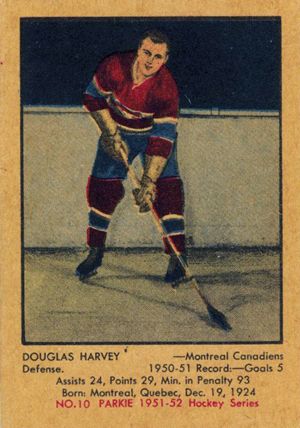
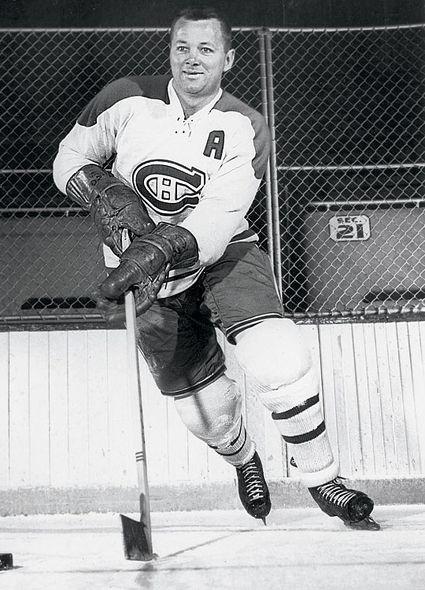
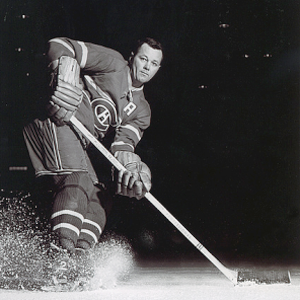
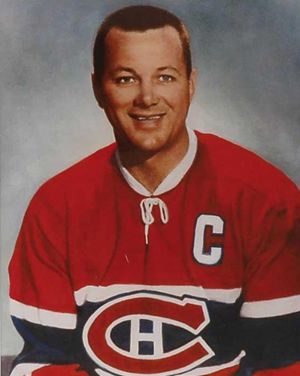
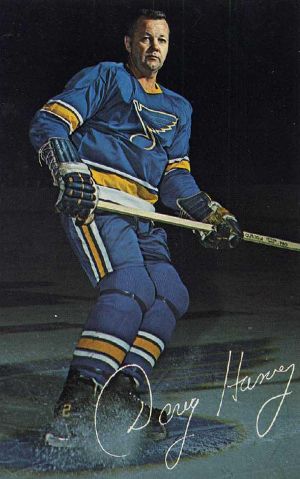
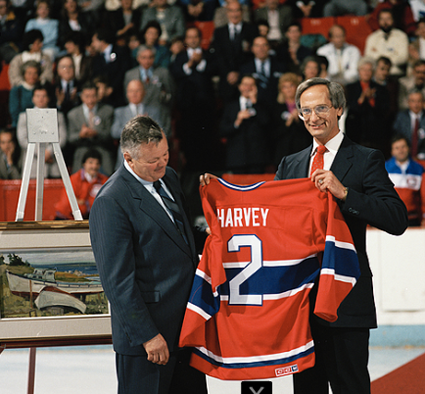
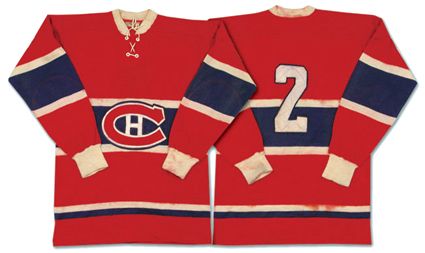










No comments:
Post a Comment
We welcome and encourage genuine comments and corrections from our readers. Please no spam. It will not be approved and never seen.